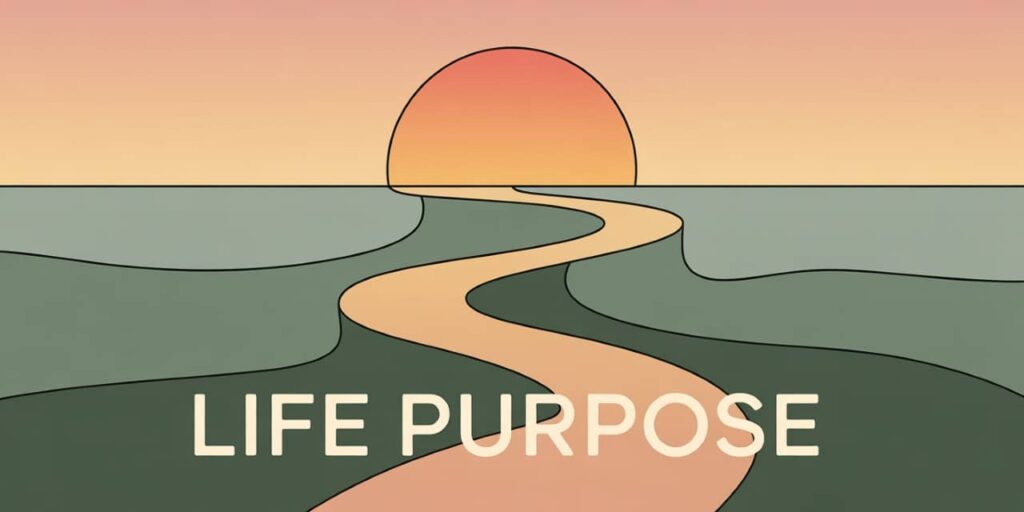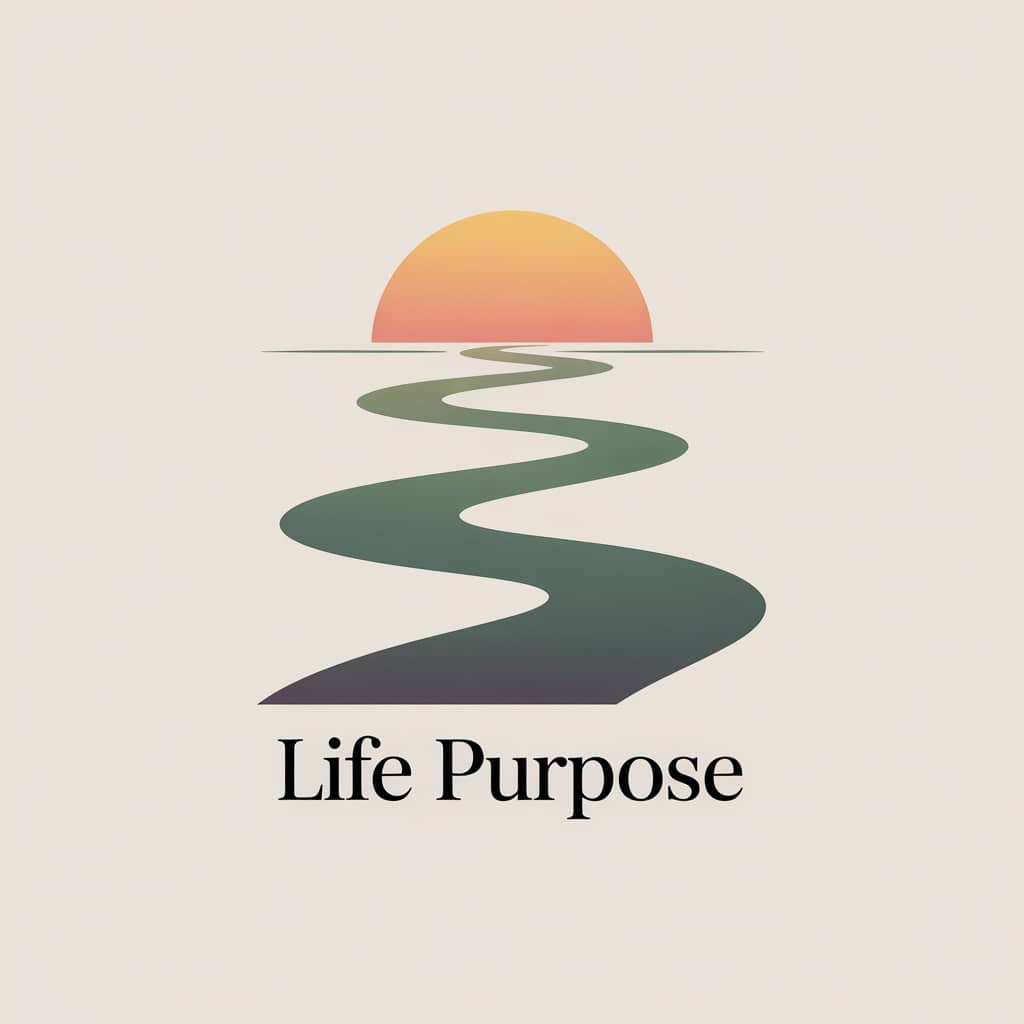
Have you ever found yourself staring at the ceiling, wondering what exactly you’re meant to do with this one precious life? If so, you’re not alone. Learning how to find your life purpose is perhaps one of the most profound journeys we can undertake as humans. It’s also one that many of us struggle with at various points in our lives.
In this comprehensive guide, we’ll explore practical strategies, thoughtful questions, and proven techniques to help you uncover your unique purpose. Whether you’re feeling lost, going through a transition, or simply curious about digging deeper into what makes you tick, this article will serve as your roadmap.
What is the purpose of life?
Before diving into how to find your life purpose, let’s address the philosophical elephant in the room: what exactly do we mean by “purpose” anyway?
At its core, life purpose represents the central motivating aims of your life, the reason you get up in the morning. It’s the thing that drives you, fulfills you, and gives your actions meaning. Purpose provides both direction and significance. It’s about contributing to something larger than yourself while also honoring who you truly are.
From a biological perspective, the purpose of life is straightforward: survive and reproduce. But humans are not just biological machines. We crave meaning. We are storytellers, artists, builders, and thinkers. We seek something more than mere existence.
But here’s the beautiful truth: there’s no single “correct” purpose for everyone. Your purpose is as unique as your fingerprint. For some, purpose might revolve around raising children or supporting family. For others, it could involve creative expression, solving societal problems, or spiritual growth. The possibilities are as varied as humanity itself.
As Mark Manson aptly puts it, “The purpose of life is not happiness; it’s usefulness.” Finding your purpose often involves discovering where your talents and passions can be useful to others or to causes you care about deeply.
Many great thinkers and traditions have found that purpose often resides at the intersection of the self and the other. It’s about moving beyond our own selfish concerns and connecting to something larger. The Greater Good Science Center at UC Berkeley notes that a key component of purpose is a “desire to make a difference in the world, to contribute to matters larger than the self.” This can manifest in several ways:
- Contribution and Service: The feeling of being useful and making a positive impact on the lives of others is a powerful source of purpose. This doesn’t require saving the world. It can be as simple as being a good listener for a friend, mentoring a junior colleague, or volunteering for a local cause you care about. It’s about contributing your unique gifts to the well being of the collective.
- Connection and Belonging: We are social creatures. Purpose is often found in our relationships: in the love we share with our family, the camaraderie we feel with our friends, and the sense of belonging we get from our community. Nurturing these connections and building strong, supportive relationships is a deeply purposeful act.
- Growth and Expression: Life is also about becoming. It’s about learning, growing, and evolving into the fullest expression of ourselves. This is the purpose found in mastering a skill, overcoming a personal challenge, or developing wisdom through experience. It’s the journey of self actualization, of realizing your own potential.
- Experience and Appreciation: Sometimes, purpose isn’t about doing, but about being. It’s found in experiencing the beauty of the world, in feeling awe at a sunset, in appreciating a piece of music, or in savoring a delicious meal. It is the purpose of bearing witness to the wonder of existence.
So, what is the purpose of life? Perhaps it’s a blend of all these things. To contribute, to connect, to grow, and to experience. Your personal purpose is simply your unique and individual way of engaging with these universal human drives. It’s your specific way of adding your verse to the powerful play of life.
Common misconceptions about life purpose
Before we go further, let’s clear up some misconceptions:
- Purpose isn’t always about career. While work can be a significant expression of purpose, purpose extends beyond your job title.
- Purpose doesn’t have to be grandiose. You don’t need to cure cancer or become famous to have purpose. Small, consistent actions aligned with your values create meaningful purpose too.
- Purpose isn’t static. It can evolve throughout your life as you grow, learn, and experience different things.
- You don’t need to have it all figured out today. Finding purpose is a journey, not a one-time decision.
Now that we’ve established what purpose is (and isn’t), let’s explore how to find it.
How to find your life purpose: The foundation

Finding your life purpose begins with looking inward. Self-discovery forms the bedrock of this journey, as your purpose emerges from the unique intersection of your strengths, values, and experiences.
Start with self-reflection
Self-reflection might sound simple, but it requires deliberate effort in our busy lives. Here are some effective ways to begin:
Journaling: According to Wondermind, regular journaling about your thoughts, feelings, and experiences can reveal patterns and highlight what truly matters to you. Try writing for 10-15 minutes each day without censoring yourself.
Try these prompts to get started:
- The Energy Audit: At the end of each day, write down one thing that gave you energy and one thing that drained your energy. Do this for a week or two and look for patterns. Did talking to a specific friend light you up? Did a certain type of task at work make you feel alive? Did sitting in a particular meeting make you want to crawl out of your skin? This is valuable data.
- Childhood Curiosity: What did you love to do as a kid, before you started worrying about what was “practical” or “cool”? Were you constantly building forts, writing stories, taking apart electronics, or organizing your toys? These early passions often hold a kernel of your most authentic self.
- The “Flow State” Tracker: The psychologist Mihaly Csikszentmihalyi described “flow” as a state of being so completely absorbed in an activity that you lose track of time. What activities put you in a state of flow? Maybe it’s cooking, playing a musical instrument, coding, or getting lost in a spreadsheet. Pay attention to these moments. They are signposts pointing toward what genuinely engages you.
Meditation: Regular meditation creates mental space to notice your authentic thoughts and feelings. As Shilpa Kapilavai notes, “Mindfulness practice helps quiet the external noise so you can hear your inner wisdom more clearly.”
Life review exercise: Take time to review your life story so far. What have been the pivotal moments? When have you felt most alive or proud? What threads connect these experiences?
The Art of Self Discovery: Becoming an Archeologist of You
Imagine your life purpose isn’t something you need to create out of thin air. Instead, imagine it’s an ancient city buried just beneath the surface of your daily life. Your job isn’t to build the city, but to excavate it. This process of deep self inquiry, what many call self discovery, is the first and most crucial step. It’s about clearing away the dust of other people’s expectations and your own limiting beliefs to see what’s truly there.
Asking Better Questions
The quality of your answers is determined by the quality of your questions. Instead of asking a vague question like “What should I do with my life?”, we need to get more specific. Spend some quiet time, perhaps on a walk or sitting in a park, and reflect on some more powerful questions. Don’t try to answer them all at once. Let them marinate.
- What topics do you find yourself reading about or watching videos about in your free time?
- What makes you angry about the world? What injustice fires you up? (Anger can be a powerful source of motivation).
- If you had to teach someone a skill, what would you teach?
- What do your friends and family come to you for advice about? (This can be a clue to your natural strengths).
- Imagine you’re 90 years old, looking back on your life. What do you want to have seen, done, and contributed? What would you regret not doing?
Conducting a Values Audit: Your Personal Constitution
If your purpose is your “why,” your values are the principles that support that “why.” They are your personal, non negotiable rules of engagement for life. When your actions are aligned with your values, you feel a sense of rightness and integrity. When they aren’t, you feel conflicted, stressed, and out of sync. Many of us have never consciously defined our values, so we end up adopting them from our family, culture, or workplace, which can lead to that feeling of inauthenticity.
Let’s fix that. Here’s a simple exercise to clarify your core values:
- Brainstorm: Look up a list of core values online (words like Authenticity, Connection, Growth, Security, Creativity, Compassion, etc.). Go through the list and circle every word that resonates with you. Don’t overthink it, just go with your gut.
- Group and Theme: Look at the words you’ve circled. Do you see any themes? Maybe “Adventure,” “Freedom,” and “Spontaneity” can be grouped together. Perhaps “Community,” “Family,” and “Connection” form another group.
- Prioritize: Now, from your broader list, force yourself to choose your top 5 core values. This is the hard part. It requires you to be ruthlessly honest. Which values are so fundamental to who you are that life would feel empty without them? These top 5 form your personal constitution.
- Define: For each of your top 5 values, write a sentence or two defining what it means to you. “Creativity” for one person might mean painting masterpieces; for another, it might mean finding innovative solutions to problems at work. This personal definition is key.
Once you have this list, it becomes a powerful decision making tool. When faced with a choice, whether it’s a new job offer or how to spend your weekend, you can ask: “Which option aligns best with my core values of Connection, Growth, and Creativity?” This simple check in can bring incredible clarity and steer you consistently toward a more purposeful life.
Assess your strengths and talents
We often take our natural abilities for granted, but they provide important indicators of your potential purpose. Consider:
What comes naturally to you? Skills that feel effortless might be clues to your innate talents.
What do others recognize in you? Sometimes others see our gifts more clearly than we do. As Josh Dolin suggests, “Ask trusted friends what they see as your unique contributions or strengths.”
When do you experience flow? Notice activities where you lose track of time and feel fully engaged. These flow states often occur when you’re operating in your zone of genius.
Several assessment tools can help with this process, including:
- StrengthsFinder assessment
- Myers-Briggs Type Indicator
- VIA Character Strengths Survey
- DISC personality profile
Examine your passions and interests
What topics, activities, or causes consistently capture your attention? What would you choose to learn about or do if money and time weren’t constraints?
Jeanne Nangle recommends keeping a “curiosity journal” where you simply note what naturally piques your interest each day. Over time, patterns emerge that might point toward purpose.
What is my purpose in life? Asking the right questions

This is where the rubber meets the road. We’ve done the internal excavation and considered the philosophical landscape. Now it’s time to synthesize this information and start connecting the dots to figure out what your purpose looks like in practice. This is about moving from abstract ideas like “values” and “passions” to concrete possibilities.
The Intersection Method: Where Your Gifts Meet the World’s Needs
A powerful framework for identifying potential purpose areas is to find the overlap between a few key domains. It’s a bit like a Venn diagram for your soul. You are looking for the sweet spot where what you love, what you’re good at, and what the world needs come together. The Japanese concept of Ikigai explores a similar idea, beautifully translating to “a reason for being.”
Let’s create a table to map this out for yourself. Take a piece of paper and draw four columns, or simply use the template below. Spend some real time filling this out.
| What I Love (Passions & Interests) | What I’m Good At (Skills & Strengths) | What the World Needs (Problems to Solve) | The Sweet Spot (Potential Purpose Areas) |
|---|---|---|---|
| e.g., Deep conversations, understanding people, reading. | e.g., Empathetic listening, clear writing, synthesizing info. | e.g., People feel isolated, mental health support is needed. | e.g., Becoming a therapist, starting a support group, writing a blog about connection. |
| e.g., Nature, hiking, environmental documentaries. | e.g., Project management, organizing groups, public speaking. | e.g., Local parks need cleanup, climate change education. | e.g., Organizing community cleanup days, starting a green initiative at work, creating educational content. |
| e.g., Puzzles, video games, fixing broken things. | e.g., Logical thinking, attention to detail, persistence. | e.g., Inefficient systems at work, complex software bugs. | e.g., Becoming a programmer, a systems analyst, or the go-to problem solver on your team. |
| Your Turn: List at least 5 things. | Your Turn: List strengths you have and ones others see in you. | Your Turn: List problems big or small that you care about. | Your Turn: Brainstorm combinations from the first three columns. |
Don’t censor yourself as you fill this out. The “Sweet Spot” column is for brainstorming, not for making final decisions. The goal is to generate possibilities. Seeing it all laid out on paper can reveal surprising connections and pathways you hadn’t considered before. You might realize that your love for storytelling and your skill for organizing could make you a brilliant campaign manager for a nonprofit you believe in. Or that your passion for baking and your knack for details could lead to a small business that brings joy to your community.
Sometimes, the most direct route to purpose is through powerful questioning. The right questions can bypass your analytical mind and tap into deeper wisdom. Here are some thought-provoking questions from purpose experts:
Deep purpose-finding questions
According to Stacy Conlon, these questions can help clarify your purpose:
- If you had six months to live, what would you do with that time?
- What makes you lose track of time completely?
- What problems in the world break your heart or make you angry?
- What would you do if you knew you couldn’t fail?
- What did you love doing as a child before anyone told you what you “should” do?
Connor Beaton suggests these additional questions:
- What unique life experiences have shaped you that might help others?
- What conversations do you find yourself repeatedly drawn to?
- If you had unlimited resources, how would you contribute to the world?
Create a purpose statement
Once you’ve spent time with these reflection questions, try crafting a purpose statement. This isn’t set in stone but provides direction and clarity. A good purpose statement typically includes:
- Contribution: How you help others or the world
- Values: What principles guide you
- Strengths: What unique abilities you bring
- Passion: What energizes you
For example: “My purpose is to use my creativity and empathy to help others tell their stories in ways that foster connection and healing.”
Keep refining this statement as you gain new insights about yourself. The process of crafting it is often as valuable as the statement itself.
Finding your life purpose: Practical exploration

Self-reflection alone isn’t enough—purpose reveals itself through action and experience. Here’s how to actively explore potential purposes:
Try new experiences
Purpose often hides in unexplored territory. Commit to regularly trying new activities, especially those that:
- Align with your values
- Utilize your strengths
- Address problems you care about
- Push you slightly outside your comfort zone
The Meaning Movement recommends a “purpose experimentation practice” where you dedicate a few hours each week to exploring potential purpose areas through volunteering, classes, informational interviews, or creative projects.
Seek meaning in everyday life
Finding your life purpose doesn’t always require dramatic change. Often, it begins with bringing greater intention to your current circumstances.
Ask yourself:
- How can I bring more of my authentic self to my existing roles?
- Where can I add more value or make a difference right now?
- What parts of my current life feel most meaningful, and how can I expand those?
Connect with your community
Purpose rarely exists in isolation—it almost always involves connection to others. Expand your understanding of purpose by:
- Volunteering for causes aligned with your values
- Joining communities centered around your interests
- Seeking mentors who embody purpose in their lives
- Offering your skills to help others
As BetterUp notes, “Purpose often emerges at the intersection of what you care about and who you care about.”
Finding purpose in life through different domains
Your life purpose might express itself differently across various life domains. Let’s explore how purpose can manifest in different areas:
Career and Life’s work purpose
For many people, work represents a significant opportunity to express purpose. Consider:
- How does (or could) your work allow you to express your values?
- What problems are you uniquely positioned to solve?
- How might your career serve as a platform for your purpose?
According to Tony Robbins, “Your career doesn’t have to be your primary purpose, but it’s difficult to feel fulfilled if your work contradicts your core values.” Seek alignment between your deeper purpose and how you spend your working hours.
Relationships and family purpose
Our connections with others often form the heart of a meaningful life. Reflect on:
- How do your relationships reflect and support your values?
- What legacy do you want to leave for those you love?
- How can you more authentically show up in your relationships?
Health and wellness purpose
Your physical body is the vehicle through which you experience and express purpose. Consider:
- How does caring for your health support your larger purpose?
- What forms of movement or nutrition help you feel most alive?
- How might your health challenges inform your purpose?
Creative and intellectual purpose
The expression of ideas and creativity can be deeply purposeful:
- What ideas or beauty do you feel compelled to bring into the world?
- What topics do you never tire of learning about?
- How might your unique perspective contribute to ongoing conversations?
Spiritual purpose
For many, spirituality provides a framework for understanding purpose:
- What practices help you feel connected to something larger than yourself?
- What spiritual traditions or teachings resonate with your experience?
- How might your spiritual path inform how you show up in the world?
What is my purpose in life? Different life stages
Your purpose may evolve through different life stages. Here’s how purpose might manifest throughout life:
Purpose in youth and early adulthood
Young adulthood often focuses on exploration and discovery:
- Trying different paths
- Developing skills and abilities
- Forming identity separate from family of origin
The primary purpose questions might be: “Who am I?” and “What am I capable of?”
Purpose in midlife
Midlife often brings a shift toward deeper meaning:
- Evaluating what truly matters
- Reassessing earlier choices
- Seeking greater authenticity
- Contributing accumulated wisdom
The central purpose question shifts to: “What contribution can I make?”
Purpose in later life
Later life often involves legacy and integration:
- Synthesizing life experiences
- Mentoring younger generations
- Finding meaning in limitations
- Creating lasting impact
The guiding purpose question becomes: “What wisdom can I share?”
Common challenges in finding your life purpose
The journey to purpose isn’t always straightforward. Here are common challenges and how to navigate them:
Overcoming societal expectations
We’re bombarded with messages about what “success” looks like. To find authentic purpose:
- Question inherited definitions of success
- Recognize when you’re pursuing others’ dreams for you
- Find role models who define success on their own terms
Dealing with uncertainty
Purpose isn’t always clear immediately. When facing uncertainty:
- Embrace “purpose as practice” rather than perfect clarity
- Take small, values-aligned actions daily
- Trust that clarity often emerges through action, not before it
Navigating transitions
Major life changes often trigger purpose questioning. During transitions:
- Be patient with yourself
- Recognize that discomfort often precedes growth
- Use the disruption as an opportunity for reassessment
Comparing with others
In the age of social media, comparison can derail your purpose journey:
- Remember that you see others’ highlight reels, not their full reality
- Focus on your unique combination of gifts and experiences
- Define success by alignment with your values, not external metrics
Tools and methods for discovering your life purpose
Beyond reflection, several structured approaches can help clarify your purpose:
The Ikigai framework
This Japanese concept translates roughly to “reason for being” and represents the overlap of four elements:
- What you love
- What you’re good at
- What the world needs
- What you can be paid for
While not all purposes need to check all four boxes, this framework provides a useful starting point.
Purpose-finding worksheets and exercises
Many structured exercises can guide your purpose exploration:
Values card sort: Using physical or digital cards with different values, sort them according to importance to clarify your priorities.
Future self visualization: Imagine your ideal life 5, 10, or 20 years from now. What are you doing? Who are you with? What impact are you making?
Gratitude inventory: List experiences you’re grateful for and identify patterns in what brings you genuine appreciation.
Professional guidance
Sometimes, outside perspective helps tremendously:
Coaching: Purpose coaches specialize in guiding this specific journey.
Therapy: Particularly helpful if emotional blocks or past trauma interfere with connecting to purpose.
Career counseling: For exploring how your vocational choices align with deeper purpose.
Finding your purpose: A comparison of approaches
Different approaches work better for different people. Here’s a comparison to help you identify what might work best for you:
| Approach | Best For | Time Investment | Key Benefit | Potential Limitation |
|---|---|---|---|---|
| Reflective Journaling | Self-motivated individuals comfortable with introspection | 15-30 minutes daily | Deep personal insights | May lack external perspective |
| Purpose Workshops | Those who learn well in group settings | 1-3 intensive days | Community and structured process | May not address individual nuances |
| One-on-One Coaching | People seeking personalized guidance | 1 hour weekly for several months | Tailored support and accountability | Financial investment required |
| Purpose-Finding Apps | Tech-savvy individuals needing flexible timing | 10-15 minutes daily | Convenience and incremental progress | May lack depth of other methods |
| Sabbaticals/Retreats | Those needing immersive experience | Days to months | Concentrated focus without distractions | Requires significant time away from normal life |
| Service/Volunteering | Action-oriented individuals | Variable (weekly to monthly) | Direct experience and impact | May need complementary reflection |
How to maintain purpose once you find it
Finding your purpose is just the beginning. Here are strategies for living your purpose sustainably:
Create a purpose-driven daily practice
Small daily actions aligned with your purpose create momentum:
- Begin each day by connecting with your purpose statement
- Identify one purpose-aligned action to take each day
- End the day by reflecting on how your actions connected to purpose
Cultivate a supportive community
Surround yourself with people who support your purpose:
- Share your purpose journey with trusted friends
- Find communities of like-minded individuals
- Consider creating a “purpose accountability” partnership
Revisit and refine regularly
Your purpose will evolve as you grow:
- Schedule quarterly “purpose check-ins” with yourself
- Ask regularly: “Does this still feel aligned?”
- Be willing to refine your understanding of your purpose
Finding purpose in life during difficult times

Challenges often become catalysts for deeper purpose. Here’s how to work with difficult periods:
Finding meaning in suffering
As Viktor Frankl famously discovered in the concentration camps, finding meaning in suffering can be transformative:
- Look for lessons in challenges
- Consider how your difficult experiences might help others
- Ask what strengths these experiences have developed in you
Using crisis as a reset
Major disruptions often create space for reassessment:
- Use forced pauses as opportunities to reflect
- Question assumptions that no longer serve you
- Consider what the disruption might be making space for
Finding purpose through resilience
Bouncing back from setbacks often clarifies what matters most:
- Notice what values become clearer during challenges
- Identify what helps you persist through difficulties
- Consider how your resilience might serve others
What is the purpose of life? Perspectives across traditions
Different philosophical and spiritual traditions offer varied perspectives on purpose:
Eastern perspectives on purpose
Buddhism emphasizes alleviating suffering through mindfulness, compassion, and detachment from desires.
Hinduism suggests each person has a unique dharma (duty/purpose) based on their nature and stage of life.
Taoism focuses on living in harmony with the natural flow of life and discovering one’s authentic nature.
Western perspectives on purpose
Existentialism proposes that we create our own meaning in an otherwise meaningless universe through authentic choices.
Religious traditions like Christianity, Judaism, and Islam often frame purpose around divine relationship and service to others.
Humanism suggests purpose emerges from human connection, contribution, and the cultivation of virtue.
Finding your purpose: Real-life success stories
Learning from others’ journeys can provide inspiration for your own:
Career transformations
Consider Brené Brown, who transformed from a research professor to a globally recognized voice on vulnerability and courage by following what deeply interested her, even when it didn’t fit neatly into academic categories.
Purpose through adversity
Malala Yousafzai transformed the violence she experienced into a powerful platform advocating for girls’ education worldwide.
Everyday purpose heroes
Not all purpose stories involve fame. Consider the retired teacher who starts a community garden, connecting neighbors and addressing food insecurity, or the accountant who uses financial skills to help non-profits maximize their impact.
The ongoing journey of purpose
Finding your life purpose isn’t a one-time event but a continuous journey of growth and discovery. As you move forward:
Remember that purpose is a compass, not a destination—it provides direction rather than an endpoint.
Trust that small, consistent actions aligned with your values create meaningful purpose over time.
Embrace the evolution of your purpose as you grow and change throughout life.
Be patient with yourself—clarity often emerges gradually through action and reflection.
Finding your life purpose may be one of life’s most rewarding challenges. By combining thoughtful self-reflection with purposeful action, you can discover and live a life of meaning that honors your unique gifts and contributions to the world.
The question “how to find your life purpose” might initially feel overwhelming, but as you’ve seen throughout this guide, it’s answered through a series of smaller questions, experiments, and reflections. Your purpose likely already exists within you, waiting to be uncovered and expressed in your unique way.
What small step will you take today to move closer to living your purpose?
